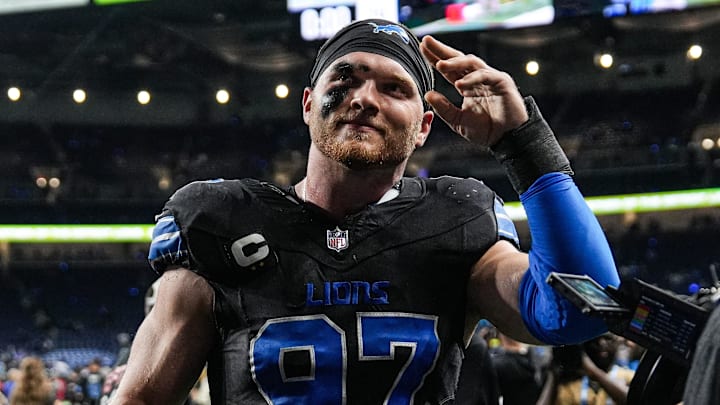The Detroit Lions dropped some massive news ahead of their Week 9 matchup with the Minnesota Vikings when star defensive end Aidan Hutchinson agreed to a contract extension on Wednesday morning. According to NFL Network’s Tom Pelissero, the contract is a four-year deal worth $180 million, keeping one of Detroit’s biggest stars in town through the 2030 season.
While the money will take a significant portion of the Lions' cap space, it also does them a massive favor. With the timing of the extension and leaving money he could have received on the table, Hutchinson and general manager Brad Holmes come out as big winners and could keep Detroit’s championship window open for the foreseeable future.
Aidan Hutchinson’s $45M Annual Salary Solves Big Problem for the Lions
At first glance, Hutchinson’s new deal may leave you wondering about the Lions' ability to build a roster. The Athletic’s Colton Pouncy noted that Detroit has signed quarterback Jared Goff ($212 million), running back David Montgomery ($18.25 million), wide receivers Amon-Ra St. Brown ($120.1 million) and Jameson Williams ($83 million) and offensive tackles Penei Sewell ($112 million) and Taylor Decker ($60 million), defensive tackle Alim McNeill ($97 million) and safety Kerby Joseph ($86 million) to extensions recently. Throwing Hutchinson’s mega-deal on top of that creates a challenge for Holmes and the Lions front office, but there’s also a benefit to getting this deal done.
The first part is negotiating a new contract with the Lions during the season. After failing to reach an agreement on an extension before the season, Hutchinson could have taken the path of most star players, focusing on the season and going back to the negotiating table next spring. If that happened, Hutchinson could have another All-Pro selection or even a Defensive Player of the Year Award added to his resume, creating a good reason for more money.
This played out this past offseason when Maxx Crosby ($35.5 million annual average value), Myles Garrett ($40 million), and Micah Parsons ($46.5 million) set the market in succession. Many figured Hutchinson would be the next pass rusher to set a new standard, but his $45 million average annual salary slots right underneath Parsons’s contract.
The other benefit for Detroit is that it doesn’t have Hutchinson’s contract hanging over the organization. In the case of Crosby, Garrett, and Parsons, each contract was preceded by trade rumors, with the Parsons situation ultimately leading to a departure from the Dallas Cowboys to the Green Bay Packers. With Hutchinson’s contract done, they don’t have to deal with a “Top Five Trade Destinations for Aidan Hutchinson” trend on social media and can focus their attention on the second half of the year.
In the short term, this means passing on a trade for edge-rushing depth ahead of next week’s trade deadline. The Lions have already found some of their depth internally, as Al-Quadin Muhammad’s breakout has given Hutchinson a suitable complement on the opposite side. This led Hutchinson to campaign for the front office not to make a trade when speaking with reporters last week.
“I mean, where do we rank in sacks right now?” Hutchinson asked via Woodward Sports Network. “...I don’t know what the people want. But all I know is that the guys we got right now, we’re producing. That kind of tells the story.”
Hutchinson’s Contract Helps Lions Keep Championship Window Open
While the Lions may have eliminated a big distraction by getting the extension done, they also cleared a path for what’s next. Sports Illustrated’s Albert Breer noted that running back Jahmyr Gibbs, linebacker Jack Campbell, tight end Sam LaPorta, and safety Brian Branch are all eligible for deals when the 2025 season ends. Hutchinson leaving money on the table could ensure nobody in that group becomes a salary cap casualty.
It also allows Detroit to keep complementing its core in free agency. While the Lions have not been aggressive shoppers under Brad Holmes, they had just $2.5 million in cap space in 2026 before Hutchinson’s extension dropped on Wednesday morning. Part of the extension could have also moved around money, kicking it into future years, allowing the Lions financial flexibility to complement next year’s team and beyond.
Put it all together, $180 million looks like a sweetheart deal for the Lions, who should be able to compete in the NFC for years to come.
